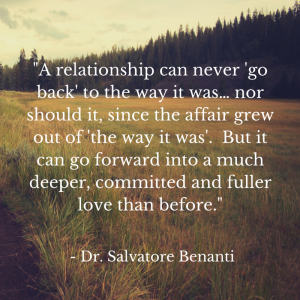Expert Q&A: Marital Reconciliation After An Affair
 Has your marriage been rocked by infidelity? For many couples, the anger, hurt, and sense of betrayal that result from discovering a spouse’s cheating are often insurmountable. For other couples, however, saving the relationship can still be possible — if the couple is willing to fully engage in the process of healing emotional wounds.
Has your marriage been rocked by infidelity? For many couples, the anger, hurt, and sense of betrayal that result from discovering a spouse’s cheating are often insurmountable. For other couples, however, saving the relationship can still be possible — if the couple is willing to fully engage in the process of healing emotional wounds.
Does attempting marital reconciliation make sense for you and your spouse? We asked Dr. Salvatore Benanti, therapist and founder of the The Center For Optimum Living in Kinnelon, NJ, for his expert take on what couples can expect from the reconciliation process.
Q: Is there a “typical” type of couple that tends to be a good candidate for attempting reconciliation after infidelity?
A: Yes, psychologically mature people who are able to recognize that the infidelity was a symptom of a deeper problem, either within one or both of them as individuals, and/or between them as a couple. With that recognition in place, they can try to navigate through their behaviors as well as both the feelings and ideas that drive them. If they really focus and work hard at it, they can come to better understand of themselves, each other and their relationship… and remedy the underlying cause(s). If each of them had previously been in some type of individual therapy or personal growth counseling, they may have the added advantage of already being more self-aware than those for whom enhanced self-awareness is something new. But that is not necessary.
Q: What are some effective strategies couples can employ when attempting to reconcile? What strategies tend not to work?
A: It is most important that the couple not engage in the “blame and shame” game. That will only serve to build their defenses and alienate each of them further. If they truly want to reconcile, they will get further faster if they learn to shift their communication style away from combative debate and toward a respectful dialogue. Typically, after an affair there are lots of strong feelings on both sides that need to be expressed, and learning to do that constructively while keeping their eye on the goal of reconciliation is essential. I sometimes suggest that a couple see their wounded relationship as a wounded child who needs as much nurturance and tender loving care as possible in order to heal.
Another key factor involves becoming more mindful of the ongoing need in all relationships to align ones attitudes and behaviors with what is most deeply valued. Here is where softening the ego and opening the heart comes into play. While easier said than done, this allows for new attitudes and meanings to emerge that can bring greater understanding, compassion, forgiveness and love for the other into the picture. This usually involves each of them opening to healthier and more positive perspectives and behaviors in their roles as spouses and parents.
As a general rule, by exploring the sources and diffusing the triggers of our reactive behaviors, and realigning our actions with our deepest and truest desires, we can all become more influential in co-creating relationships that are more fulfilling. But this requires both partners to take personal responsibility for genuinely personifying and carefully manifesting more of their best qualities.
Q: Are there any silver linings to reconciling after infidelity? Have you ever seen a case where a couple has emerged with their relationship stronger than before?
A: Absolutely! But first it must be understood that the relationship can never “go back” to the way it was… nor should it, since the affair grew out of “the way it was”. But it can go forward into a much deeper, committed and fuller love than before. I have worked with many couples over the years who in giving their all to the process, both individually and together, succeeded in starting a new chapter in their lives together. They then went forward into experiencing a much stronger bond through the ongoing practice of intentionally improving themselves, respecting and supporting one another and fulfilling more of their relationship’s best potentials.
Keep in mind that all this can never be done perfectly. But when each of them sees things moving in that direction (mostly, primarily and continually more consistently), then compassion, patience and forgiveness of shortcomings can grow and become a new and powerful support to their new and improved relationship.
Thank you, Dr. Benanti! Are you interested in pursuing reconciliation? In addition to the emotional steps of healing your relationship, there are legal steps you take to reconcile, including putting in place a reconciliation agreement. For more information, please contact us to discuss your options.



